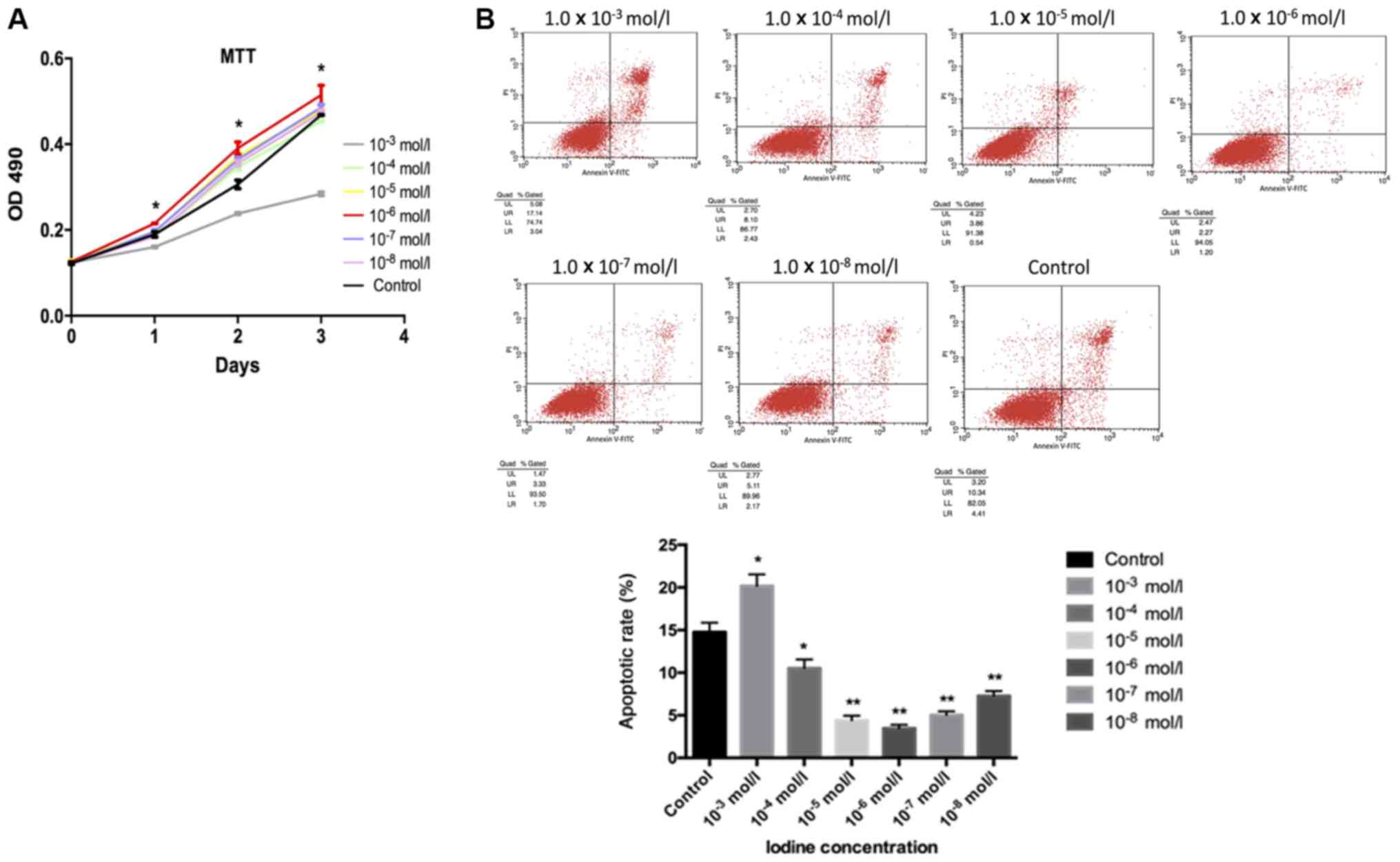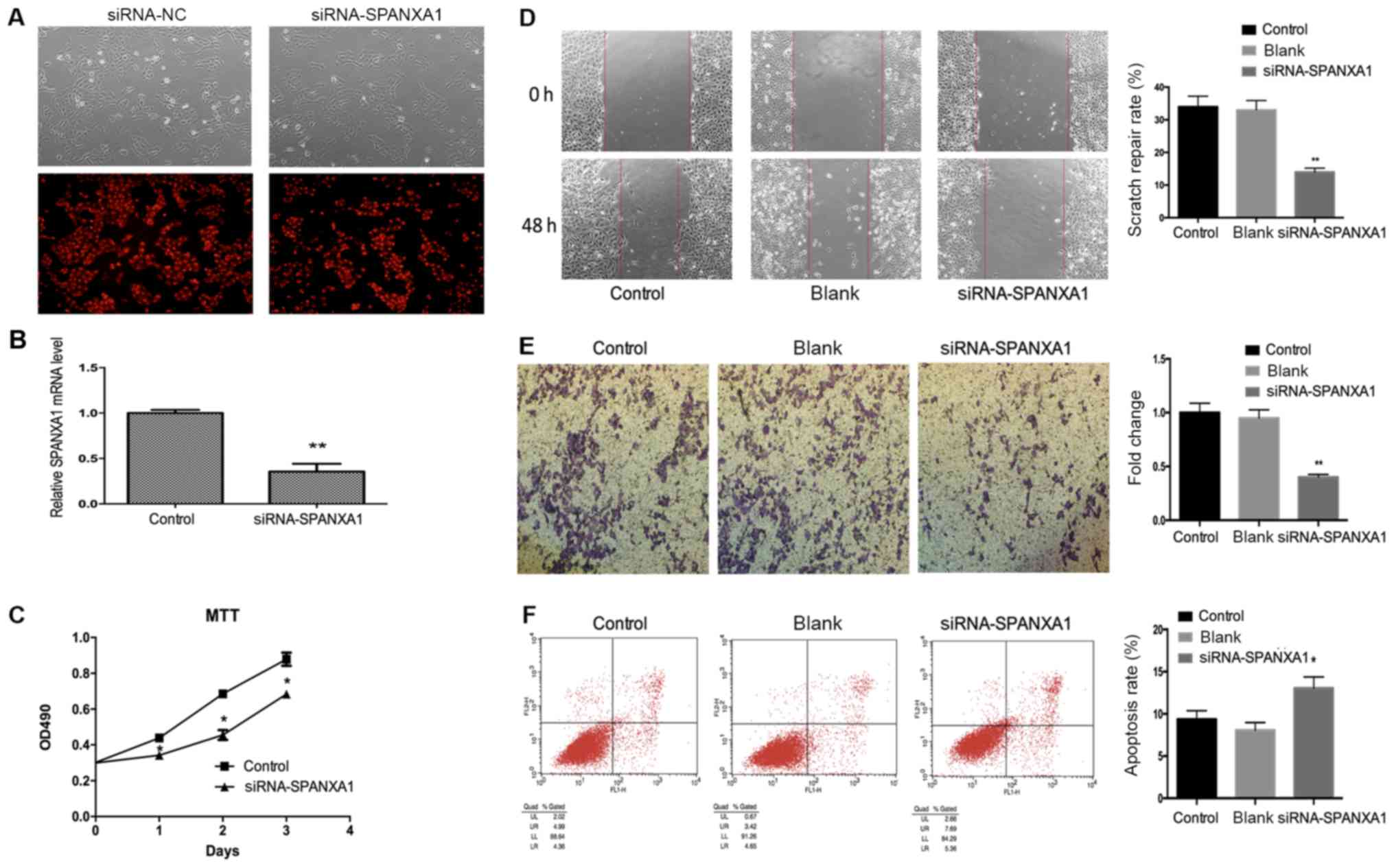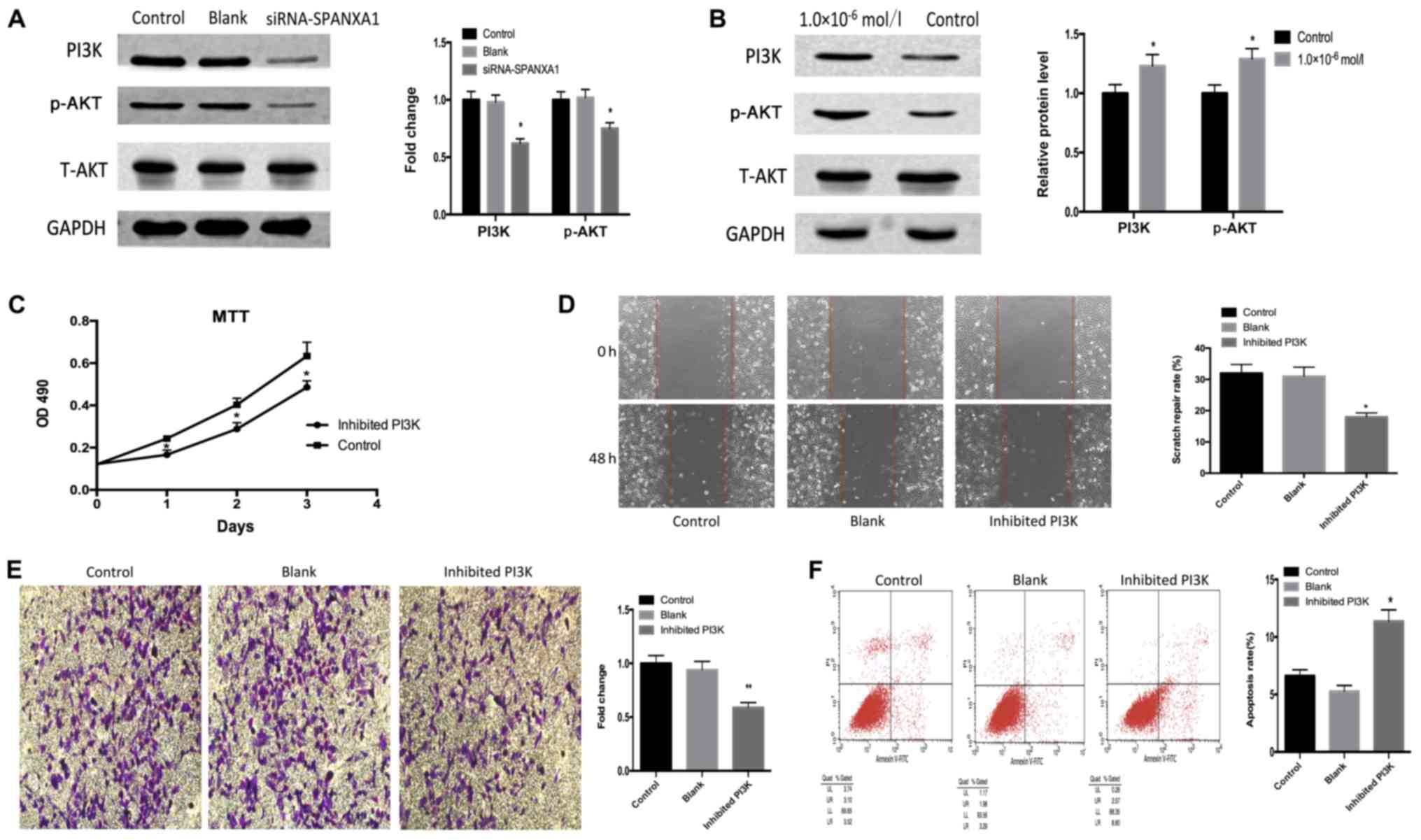|
1
|
Siegel R, Ma J, Zou Z and Jemal A: Cancer
statistics, 2014. CA Cancer J Clin. 64:9–29. 2014. View Article : Google Scholar : PubMed/NCBI
|
|
2
|
Nikiforov YE, Steward DL, Robinson-Smith
TM, Haugen BR, Klopper JP, Zhu Z, Fagin JA, Falciglia M, Weber K
and Nikiforova MN: Molecular testing for mutations in improving the
fine-needle aspiration diagnosis of thyroid nodules. J Clin
Endocrinol Metab. 94:2092–2098. 2009. View Article : Google Scholar : PubMed/NCBI
|
|
3
|
Ahn HS, Kim HJ and Welch HG: Korea's
thyroid-cancer ‘epidemic’-screening and overdiagnosis. N Engl J
Med. 371:1765–1767. 2014. View Article : Google Scholar : PubMed/NCBI
|
|
4
|
Oh CM, Won YJ, Jung KW, Kong HJ, Cho H,
Lee JK, Lee DH and Lee KH; Community of Population-Based Regional
Cancer Registries, : Cancer statistics in Korea: Incidence,
mortality, survival, and prevalence in 2013. Cancer Res Treat.
48:436–450. 2016. View Article : Google Scholar : PubMed/NCBI
|
|
5
|
Davies L and Welch HG: Current thyroid
cancer trends in the United States. JAMA Otolaryngol Head Neck
Surg. 140:317–322. 2014. View Article : Google Scholar : PubMed/NCBI
|
|
6
|
Solis OE, Mehta RI, Lai A, Mehta RI,
Farchoukh LO, Green RM, Cheng JC, Natarajan S, Vinters HV,
Cloughesy T and Yong WH: Rosette-forming glioneuronal tumor: A
pineal region case with IDH1 and IDH2 mutation analyses and
literature review of 43 cases. J Neurooncol. 102:477–484. 2011.
View Article : Google Scholar : PubMed/NCBI
|
|
7
|
Zarkesh M, Zadeh-Vakili A, Akbarzadeh M,
Fanaei SA, Hedayati M and Azizi F: The role of matrix
metalloproteinase-9 as a prognostic biomarker in papillary thyroid
cancer. BMC Cancer. 18:11992018. View Article : Google Scholar : PubMed/NCBI
|
|
8
|
Choi C, Thi Thao Tran N, Van Ngu T, Park
SW, Song MS, Kim SH, Bae YU, Ayudthaya PDN, Munir J, Kim E, et al:
Promotion of tumor progression and cancer stemness by MUC15 in
thyroid cancer via the GPCR/ERK and integrin-FAK signaling
pathways. Oncogenesis. 7:852018. View Article : Google Scholar : PubMed/NCBI
|
|
9
|
Kim M, Jeon MJ, Oh HS, Park S, Song DE,
Sung TY, Kim TY, Chung KW, Kim WB, Shong YK, et al: Prognostic
implication of N1b classification in the eighth edition of the
tumor-node-metastasis staging system of differentiated thyroid
cancer. Thyroid. 28:496–503. 2018. View Article : Google Scholar : PubMed/NCBI
|
|
10
|
Xu X, Quiros RM, Gattuso P, Ain KB and
Prinz RA: High prevalence of BRAF gene mutation in papillary
thyroid carcinomas and thyroid tumor cell lines. Cancer Res.
63:4561–4567. 2003.PubMed/NCBI
|
|
11
|
Kim S, Chung JK, Min HS, Kang JH, Park DJ,
Jeong JM, Lee DS, Park SH, Cho BY, Lee S and Lee MC: Expression
patterns of glucose transporter-1 gene and thyroid specific genes
in human papillary thyroid carcinoma. Nucl Med Mol Imaging.
48:91–97. 2014. View Article : Google Scholar : PubMed/NCBI
|
|
12
|
Kitahara CM: New evidence on the
association between prediagnostic thyroid-stimulating hormone
levels and thyroid cancer risk. Cancer Epidemiol Biomarkers Prev.
26:1163–1164. 2017. View Article : Google Scholar : PubMed/NCBI
|
|
13
|
Williams D: Radiation carcinogenesis:
Lessons from Chernobyl. Oncogene. 27 (Suppl 2):S9–S18. 2008.
View Article : Google Scholar : PubMed/NCBI
|
|
14
|
Pellegriti G, Frasca F, Regalbuto C,
Squatrito S and Vigneri R: Worldwide increasing incidence of
thyroid cancer: Update on epidemiology and risk factors. J Cancer
Epidemiol. 2013:9652122013. View Article : Google Scholar : PubMed/NCBI
|
|
15
|
Teng W, Shan Z, Teng X, Guan H, Li Y, Teng
D, Jin Y, Yu X, Fan C, Chong W, et al: Effect of iodine intake on
thyroid diseases in China. N Engl J Med. 354:2783–2793. 2006.
View Article : Google Scholar : PubMed/NCBI
|
|
16
|
Kim JS: Reply to: Papillary thyroid
microcarcinoma in developing country scenario with endemic iodine
deficiency. Surgery. 162:1912017. View Article : Google Scholar : PubMed/NCBI
|
|
17
|
Zamrazil V, Cerovska J, Bílek R, Simecková
A, Vrbíková J, Dvoráková M, Hníková O, Janecková M and Tomiska F:
The effect of insufficient iodine intake on the size and function
of the thyroid gland. Bratisl Lek Listy. 96:609–612. 1995.(In
Czech). PubMed/NCBI
|
|
18
|
Fiore E, Latrofa F and Vitti P: Iodine,
thyroid autoimmunity and cancer. Eur Thyroid J. 4:26–35. 2015.
View Article : Google Scholar : PubMed/NCBI
|
|
19
|
Liu XH, Chen GG, Vlantis AC and van
Hasselt CA: Iodine mediated mechanisms and thyroid carcinoma. Crit
Rev Clin Lab Sci. 46:302–318. 2009. View Article : Google Scholar : PubMed/NCBI
|
|
20
|
Dijkstra B, Prichard RS, Lee A, Kelly LM,
Smyth PP, Crotty T, McDermott EW, Hill AD and O'Higgins N: Changing
patterns of thyroid carcinoma. Ir J Med Sci. 176:87–90. 2007.
View Article : Google Scholar : PubMed/NCBI
|
|
21
|
Maier J, van Steeg H, van Oostrom C,
Paschke R, Weiss RE and Krohn K: Iodine deficiency activates
antioxidant genes and causes DNA damage in the thyroid gland of
rats and mice. Biochim Biophys Acta. 1773:990–999. 2007. View Article : Google Scholar : PubMed/NCBI
|
|
22
|
Gerard AC, Humblet K, Wilvers C, Poncin S,
Derradji H, de Ville de Goyet C, Abou-el-Ardat K, Baatout S,
Sonveaux P, Denef JF and Colin IM: Iodine-deficiency-induced long
lasting angiogenic reaction in thyroid cancers occurs via a
vascular endothelial growth factor-hypoxia inducible
factor-1-dependent, but not a reactive oxygen species-dependent,
pathway. Thyroid. 22:699–708. 2012. View Article : Google Scholar : PubMed/NCBI
|
|
23
|
Aschebrook-Kilfoy B, Grogan RH, Ward MH,
Kaplan E and Devesa SS: Follicular thyroid cancer incidence
patterns in the United States, 1980–2009. Thyroid. 23:1015–1021.
2013. View Article : Google Scholar : PubMed/NCBI
|
|
24
|
Sun R, Wang J, Li X, Li L, Yang J, Ren Y,
Xi Y and Sun C: Effect of iodine intake on p14ARF and p16INK4a
expression in thyroid papillary carcinoma in rats. Med Sci Monit.
21:2288–2293. 2015. View Article : Google Scholar : PubMed/NCBI
|
|
25
|
Guan H, Ji M, Bao R, Yu H, Wang Y, Hou P,
Zhang Y, Shan Z, Teng W and Xing M: Association of high iodine
intake with the T1799A BRAF mutation in papillary thyroid cancer. J
Clin Endocrinol Metab. 94:1612–1617. 2009. View Article : Google Scholar : PubMed/NCBI
|
|
26
|
Saiselet M, Floor S, Tarabichi M, Dom G,
Hébrant A, van Staveren WC and Maenhaut C: Thyroid cancer cell
lines: An overview. Front Endocrinol (Lausanne). 3:1332012.
View Article : Google Scholar : PubMed/NCBI
|
|
27
|
Cao X, Ma W, Liu L, Xu J, Wang H, Li X,
Wang J, Zhang J, Wang Z and Gu Y: Analysis of potassium iodate
reduction in tissue homogenates using high performance liquid
chromatography-inductively coupled plasma-mass spectrometry. J
Trace Elem Med Biol. 32:1–6. 2015. View Article : Google Scholar : PubMed/NCBI
|
|
28
|
Wang F, Wang Y, Wang L, Wang X, Sun C,
Xing M and Zhao W: Strong association of high urinary iodine with
thyroid nodule and papillary thyroid cancer. Tumour Biol.
35:11375–11379. 2014. View Article : Google Scholar : PubMed/NCBI
|
|
29
|
Zhang YY, Liu ZB, Ye XG and Ren WM: Iodine
regulates G2/M progression induced by CCL21/CCR7 interaction in
primary cultures of papillary thyroid cancer cells with RET/PTC
expression. Mol Med Rep. 14:3941–3946. 2016. View Article : Google Scholar : PubMed/NCBI
|
|
30
|
Salemi M, Calogero AE, Vicari E, Migliore
E, Zaccarello G, Cosentino A, Amore M, Tricoli D, Castiglione R,
Bosco P and Rappazzo G: A high percentage of skin melanoma cells
expresses SPANX proteins. Am J Dermatopathol. 31:182–186. 2009.
View Article : Google Scholar : PubMed/NCBI
|
|
31
|
Wang Z, Zhang Y, Liu H, Salati E,
Chiriva-Internati M and Lim SH: Gene expression and immunologic
consequence of SPAN-Xb in myeloma and other hematologic
malignancies. Blood. 101:955–960. 2003. View Article : Google Scholar : PubMed/NCBI
|
|
32
|
Maine EA, Westcott JM, Prechtl AM, Dang
TT, Whitehurst AW and Pearson GW: The cancer-testis antigens
SPANX-A/C/D and CTAG2 promote breast cancer invasion. Oncotarget.
7:14708–14726. 2016. View Article : Google Scholar : PubMed/NCBI
|
|
33
|
Salemi M, Calogero AE, Zaccarello G,
Castiglione R, Cosentino A, Campagna C, Vicari E and Rappazzo G:
Expression of SPANX proteins in normal prostatic tissue and in
prostate cancer. Eur J Histochem. 54:e412010. View Article : Google Scholar : PubMed/NCBI
|
|
34
|
Zendman AJ, Zschocke J, van Kraats AA, de
Wit NJ, Kurpisz M, Weidle UH, Ruiter DJ, Weiss EH and van Muijen
GN: The human SPANX multigene family: Genomic organization,
alignment and expression in male germ cells and tumor cell lines.
Gene. 309:125–133. 2003. View Article : Google Scholar : PubMed/NCBI
|
|
35
|
Yu K, Ganesan K, Tan LK, Laban M, Wu J,
Zhao XD, Li H, Leung CH, Zhu Y, Wei CL, et al: A precisely
regulated gene expression cassette potently modulates metastasis
and survival in multiple solid cancers. PLoS Genet. 4:e10001292008.
View Article : Google Scholar : PubMed/NCBI
|
|
36
|
Roth RB, Hevezi P, Lee J, Willhite D,
Lechner SM, Foster AC and Zlotnik A: Gene expression analyses
reveal molecular relationships among 20 regions of the human CNS.
Neurogenetics. 7:67–80. 2006. View Article : Google Scholar : PubMed/NCBI
|
|
37
|
Fresno Vara JA, Casado E, de Castro J,
Cejas P, Belda-Iniesta C and Gonzalez-Baron M: PI3K/Akt signalling
pathway and cancer. Cancer Treat Rev. 30:193–204. 2004. View Article : Google Scholar : PubMed/NCBI
|
|
38
|
Dillon RL, White DE and Muller WJ: The
phosphatidyl inositol 3-kinase signaling network: Implications for
human breast cancer. Oncogene. 26:1338–1345. 2007. View Article : Google Scholar : PubMed/NCBI
|
|
39
|
Wen D, Deng L, Zhou M, Guo S, Shang L, Xu
G and Dong S: A biofuel cell with a single-walled carbon
nanohorn-based bioanode operating at physiological condition.
Biosens Bioelectron. 25:1544–1547. 2010. View Article : Google Scholar : PubMed/NCBI
|
|
40
|
Liu R, Liu D, Trink E, Bojdani E, Ning G
and Xing M: The Akt-specific inhibitor MK2206 selectively inhibits
thyroid cancer cells harboring mutations that can activate the
PI3K/Akt pathway. J Clin Endocrinol Metab. 96:E577–E585. 2011.
View Article : Google Scholar : PubMed/NCBI
|
|
41
|
Xing M: Genetic alterations in the
phosphatidylinositol-3 kinase/Akt pathway in thyroid cancer.
Thyroid. 20:697–706. 2010. View Article : Google Scholar : PubMed/NCBI
|
|
42
|
Uddin S, Bavi P, Siraj AK, Ahmed M,
Al-Rasheed M, Hussain AR, Ahmed M, Amin T, Alzahrani A, Al-Dayel F,
et al: Leptin-R and its association with PI3K/AKT signaling pathway
in papillary thyroid carcinoma. Endocr Relat Cancer. 17:191–202.
2010. View Article : Google Scholar : PubMed/NCBI
|
|
43
|
Ma Y, Qin H and Cui Y: MiR-34a targets
GAS1 to promote cell proliferation and inhibit apoptosis in
papillary thyroid carcinoma via PI3K/Akt/Bad pathway. Biochem
Biophys Res Commun. 441:958–963. 2013. View Article : Google Scholar : PubMed/NCBI
|
|
44
|
Xu J, Cai J, Jin X, Yang J, Shen Q, Ding X
and Liang Y: PIG3 plays an oncogenic role in papillary thyroid
cancer by activating the PI3K/AKT/PTEN pathway. Oncol Rep.
34:1424–1430. 2015. View Article : Google Scholar : PubMed/NCBI
|
|
45
|
Serrano-Nascimento C, da Silva Teixeira S,
Nicola JP, Nachbar RT, Masini-Repiso AM and Nunes MT: The acute
inhibitory effect of iodide excess on sodium/iodide symporter
expression and activity involves the PI3K/AKT signalling pathway.
Endocrinology. 155:1145–1156. 2014. View Article : Google Scholar : PubMed/NCBI
|


















